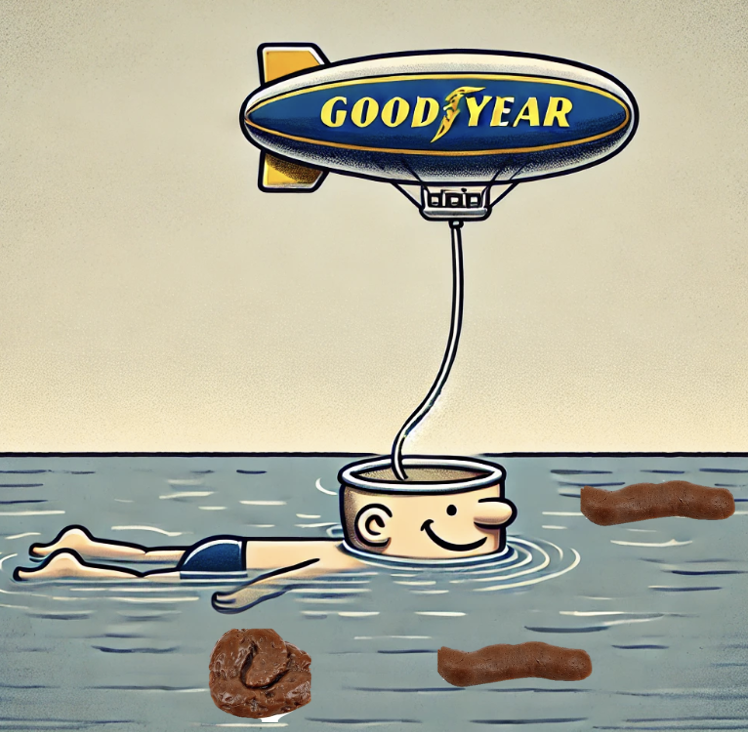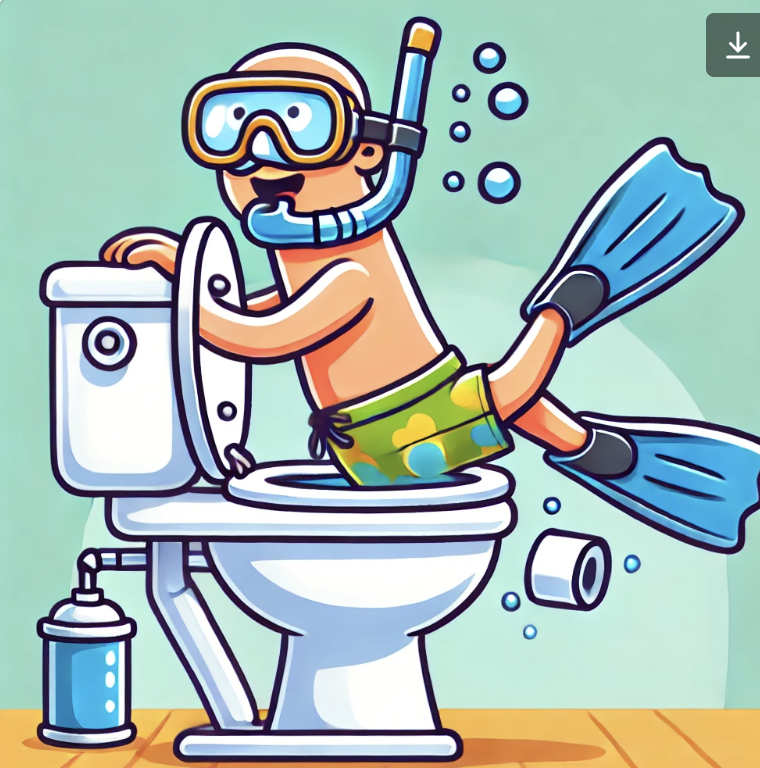
Breaking news from MedPage Today. Hot off the pot and ready to trot!
A mind-boggling 10 percent (1) of the masochists swimmers who participated in the ill-advised- Olympic open water swimming event, aka, the "Biowarfare Affair of Intestinal Despair," came down with gastroenteritis (vomiting and diarrhea). To put this in perspective, one percent to three percent of athletes who participated in the same events in Rio de Janeiro (2016) and Tokyo (2021) got sick.
"Outpolluting" Rio isn't trivial. The waters at Copacabana Beach, where the same event was held in the 2016 Olympics, aren't exactly mountain spring quality. They had (and still have) similar issues: Sewage. Here's a headline from a 2016 CBS article.

Now, that's not a reasonable request, is it? Swimmers are supposed to swim 10 kilometers without putting their heads in the water??? How's that gonna work? Maybe this?

Artist's rendering of an Olympic open water swimmer navigating a 10-kilometer doodie parade while keeping his head out of the water. John Philip Sousa did not compose a march applicable to this event.
Shameless self-promotion time
(In case you missed "Swimming in the Seine," an amusing parody of "Singing in the Rain." I wrote it last month in anticipation of precisely what happened to the swimmers. Here's a verse.)
A turd just floated by
It’s full of E. coli
Tomorrow, I’m looking forward to
Hurling at Versailles
Should the IOC try a different event?
Perhaps sewer swimming isn't such a hot idea for Olympians (or anyone else). Here's an alternative (and safer) suggestion: Toilet snorkeling.

Toilet snorkeling. Rumor has it that the International Olympic Committee (IOC) is seriously considering it for 2028.
A little science: prophylactic antibiotics?
Some countries were concerned (and rightly so) about athletes swimming in poop soup. Belgium withdrew from the mixed relay triathlon event and Germany, Switzerland, Sweden, and Norway all reported gastrointestinal illness for participants in the event (2). Australian athletes took a one-month course of antibiotics (the specific drug was not revealed) (3).
Of course, antibiotics neither treat nor prevent any viral infection, such as norovirus or COVID-19, both of which exist in wastewater. While it is theoretically possible to prevent bacterial infections, primarily E. Coli, the most common pathogen in polluted water (4) no one knows whether this is a reasonable option.
Dr. Chuck Dinerstein weighs in:
Prophylaxis against E. Coli would seem to be a reasonable consideration, but as you might suspect, there are no studies to point the way."
Dr. Henry Miller isn't a big fan of how France and IOC handled the whole affair:
"The irresponsibility of the French and Olympic authorities with respect to public health was astonishing. They were egregiously negligent not only by allowing the aquatic events to be held in the polluted Seine but also by failing to institute appropriate COVID precautions in the midst of a surge.
He adds:
More importantly, antibiotic prophylaxis before exposure to potential bacterial pathogens is dodgy; it encourages the appearance of antibiotic-resistant mutants. As for "Australian athletes took a one-month course of antibiotics...", a month's course? That's absurd.
Bottom line
In the 100 years since swimming in the Seine has been illegal, it’s hard to believe that the French could 'clean it up' in time for the Olympics. Despite some attempts, water quality remained a concern throughout the games, leading to delays and cancellations before and during the events.
Yet, Olympic athletes were required to swim in this mess for two hours – the average time to complete the event – while Parisians won't even dip a toe in it.
France and the IOC had to know that they were putting the swimmers at risk (5). They should all get tossed in there, if only just for laughs.
NOTES:
(1) This information came from the International Olympic Committee's injury and illness surveillance data.
(2) I'd bet the house that swimmers from many more countries, if not all of them, also got sick.
(3) The US athletes did not take antibiotics.
(4) There are plenty of others, including Salmonella, Hepatitis A, Giardia, and Cryptosporidium. You don't want to have a relationship with any of them.
(5) There were a number of delays and cancellations because of concerns, both before and during the games, about water quality in the Seine. Fluctuations in bacteria levels remained a concern throughout the games.



